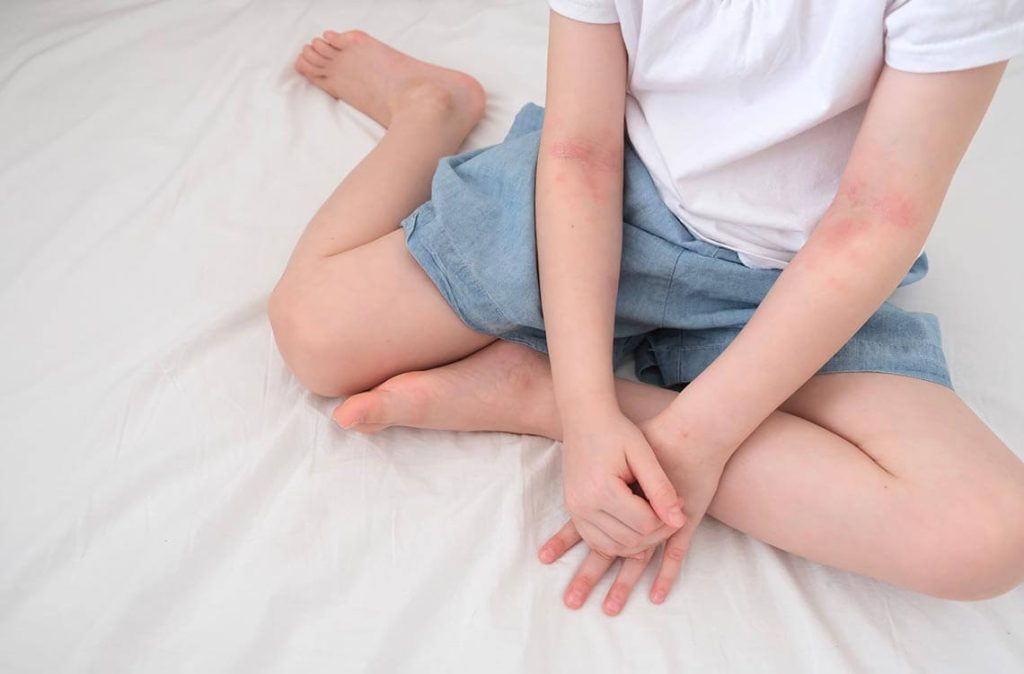Psoriasis is a genetic disorder that causes itchy, red bumps to appear on the skin. It can be passed from parent to child and can often be chronic, resulting in a lifelong condition. The most common form of childhood psoriasis is plaque psoriasis which can be identified by the tell-tale appearance of thick, silvery, red patches on the skin called plaques. While it can often be managed through lifestyle changes and medication, early detection is important for ensuring your child leads a normal, happy, healthy childhood. Here’s how to know for sure whether your child has it, so you can take the proper measures.
Symptoms of Psoriasis
Psoriasis a skin condition that results in skin cells developing too rapidly and not falling off like they should. These cells accumulate and continue growing on the surface of the skin most likely due to an overactive immune system. Often resulting in red, irritated areas on the body, particularly the knees, scalp, elbows and torso. These patches often have the appearance of white scales that can bleed and crack when touched or scratched. But other than that, here are other tell-tale symptoms to watch out for.
- red, raised patches of skin covered in white ‘scales’
- dry, sensitive skin prone to cracking
- itching, soreness, or burning in affected areas
- inflammation between folds of skin
- changes to the fingernail
- pitted
- ridges
- yellowing
- thickening
- detachment
The main cause of psoriasis is often largely genetic, with the child inheriting the disorder from one or both parents. If one parent has the condition, there’s a 16% chance that the child will develop it too. If both parents have it, there’s a 50% chance. While there is currently no cure for psoriasis, many sufferers have reported having clear, blemish free skin for years before relapsing due to an unforeseen trigger. By and large, symptoms may appear less and less as the child grows older.
Psoriasis Triggers
Just as important as it is to recognise the signs of psoriasis is identifying the triggers. Sometimes symptoms can disappear for months and even years, but your child may suddenly experience an episode out of the blue. Often even twice as worse as previous flare-ups. It’s during these times where you have to do some investigative work. But just to get your started, here are the likely culprits that may be responsible for your child’s psoriatic flare-ups:
- stress
- infection
- cold weather
- skin irritation
- medication (like lithium)
- obesity
- processed foods
- excess sugars
- saturated fats (red meat, diary)
- refined carbohydrates
Treatment for Psoriasis
A paediatrician will most often prescribe topical corticosteroids as a first measure. This medication helps to reduce inflammation, stop itching and slow down the thickening of the skin. Other topical treatments include vitamin D creams, coal tar, dithranol, and calcineurin inhibitors. Some experts also recommend phototherapy using UVB to manage symptoms. However, as per usual, always wait for the doctor’s advice before seeking out these treatments on your own.
Some oral medication may also be prescribed depending on the severity. These include oral retinoids (acitretin), immunosuppressants (cyclosporine), non-steroidal anti-inflammatories (aspirin, ibuprofen). As well as other drugs that can inhibit the growth of excess skin cells and reduce irritation.
However, some families may not be able to afford these expensive treatments. Especially not for the long-term. So, you may not necessarily want to rely on medication alone to manage symptoms. That said you can also try some of these at-home treatments that have proven benefits in managing psoriatic symptoms:
- thick, nourishing moisturiser
- humidifier
- salt baths (particularly Dead Sea salts)
- oatmeal baths
- aloe vera
- wet wraps
- omega-3 fatty acids
- probiotics
Some experts also recommend dietary recommendations to control triggers and even help the body heal itself. Some foods that you may want to introduce to your child if they have psoriasis include dark leafy greens, fatty fish (tuna, sardines, mackerel), fruits and vegetables, olive oil, whole grains, beans and nuts. These dietary additions are easy enough to implement, so try them out and they may just help reduce your child’s symptoms.
Psoriasis: A Manageable Skin Disorder
Psoriasis is not just a physical condition, it can often leave scarring, and post inflammatory hyperpigmentation. This can be a devastating blow to a young child, psychologically and emotionally. That’s why it’s all the more important to treat it early before deeper emotional scarring occurs. With early intervention and proper care, psoriasis is a manageable condition. And with regular treatment, your child has the chance to live a normal, healthy, happy life just like every other kid their age should.
Disclaimer: The information provided in this article is for informational purposes only and should not be considered as medical advice from Motherhood. For any health-related concerns, it is advisable to consult with a qualified healthcare professional or medical practitioner.
For more insightful stories and fun recipes, stay tuned to Motherhood Story!
